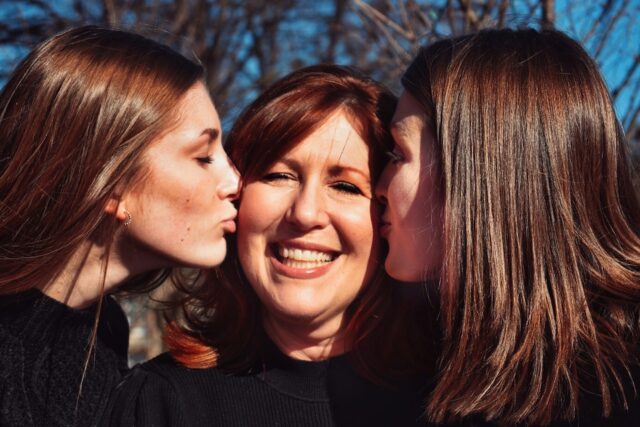By the time your kids are grown, the relationship you share isn’t just about who raised who anymore.

It’s layered with history—some beautiful, some painful, and some still unresolved. A lot of adult children carry around lots of old pain they never fully unpacked, either because they didn’t know how to bring them up or didn’t feel safe enough to. If you’re a parent who senses that things feel tense or distant, the most powerful step forward usually starts with what you say. Not grand gestures, not big plans—just honest, human words that show you’re willing to look inward first.
1. “I know I didn’t get everything right.”

This line doesn’t need bells and whistles. Just say it with your chest and mean it. You’re not here to relitigate every parenting decision—you’re showing your child that you’re aware they didn’t always get the parent they might have needed. It’s not about confessing every flaw or reliving the past in painful detail. It’s about breaking the silence around the things you both already know were hard.
Admitting you got things wrong doesn’t make you weak. It makes you human. It also gives your adult child permission to stop tiptoeing around the truth. They don’t need you to be perfect. They need you to be honest, and a sentence like this can feel like an unspoken pressure finally being lifted.
2. “You don’t owe me closeness. I just want to understand you better.”

One of the biggest changes a parent can make is letting go of the idea that your child owes you a certain kind of relationship. This sentence takes the pressure off and makes space for a more honest connection—one rooted in choice, not obligation. You’re letting them know you’re here to learn, not guilt-trip them into staying close out of duty.
Sometimes adult children pull away because every conversation feels like a test. Saying this lets them exhale. It tells them you’re not asking for anything except the chance to really know them on their terms. That alone can rebuild more trust than any advice or offer ever could.
3. “You’re allowed to see things differently than I do.”

This might be one of the most healing things you can say, especially if you’ve ever dismissed or minimised their version of events. You’re not saying their version is more accurate. You’re just saying it’s valid. That’s a huge difference, and one that helps build real adult-to-adult respect.
Your child might have spent years keeping quiet just to avoid conflict. This line tells them you’re strong enough now to handle their truth, even if it doesn’t line up with yours. It changes the dynamic from control to mutual understanding, and that’s where real connection starts to grow.
4. “I want to learn how to have a better relationship with you now, not just relive the past.”

It’s tempting to get stuck in the past, especially when you’re trying to explain where you were coming from or defend what you thought was right. However, sometimes your child isn’t looking for that. They just want to know if things can feel different now. This phrase tells them you’re not trying to justify—you’re trying to move forward.
And by framing it this way, you’re showing maturity. You’re saying: I don’t need us to keep replaying old scenes. I just want something healthier now, even if it means starting slow. That’s the kind of language that changes conversations from stuck to hopeful.
5. “You don’t have to protect my feelings. I can handle this.”

If your adult child has ever felt like telling you the truth would make you crumble, they’ve probably been editing themselves for years. That’s not closeness—that’s self-censorship. Telling them you can handle honesty without shutting down gives them the freedom to finally be real with you.
Don’t underestimate how exhausting it is to keep tiptoeing around a parent’s emotional reactions. This line offers safety. You’re saying: I’m ready now. You can say what you need to say, and I won’t fall apart or make it about me. That’s where repair begins.
6. “I’ve been reflecting on the kind of parent I was. You’ve helped me grow.”

This isn’t just about reflection—it’s about recognising your child’s influence. You’re not the only teacher in the relationship anymore. When you let them know they’ve shaped you too, it flattens the hierarchy and invites a more honest, equal connection.
It also tells them you’ve been thinking—not just reacting. You’ve looked at yourself, really looked, and you’ve seen how their presence, even their criticism, has helped you evolve. That’s not just humility. That’s the foundation of trust.
7. “Is there something you wish I’d acknowledge or understand?”

This is one of those rare questions that opens a real door. You’re not demanding anything. You’re just inviting. It gives your child a moment to say the thing they’ve probably rehearsed a dozen times in their head but never had the space to say out loud.
It’s important that you don’t interrupt, defend, or redirect. Just listen. That moment might be hard, but it can change the entire relationship because now, they’re not just your child. They’re someone whose experience you’re willing to hear—without fixing, reframing, or filtering.
8. “I don’t want you to feel like you have to be anyone other than who you are.”

This line hits especially hard if your child ever felt like they had to be the “good kid,” the high achiever, the agreeable one, or hide parts of their identity to keep your approval. It tells them, even now, they’re allowed to be their full self, and still be loved by you.
You might be decades into the relationship, but this one sentence can undo years of silent performing. It tells them you see who they actually are now, not just who they were when they were young. That kind of recognition feels like fresh air.
9. “Thank you for teaching me what boundaries look like.”

This takes the sting out of what used to feel like rejection. If your child pulled away, took space, or said no to certain topics, it wasn’t always about punishing you—it was about protecting themselves. Thanking them for that flips the script from conflict to gratitude.
It says: I didn’t fully get it at first, but I see it now. You taught me something by doing what you needed to do, even when it was uncomfortable. That’s not just respectful, it’s reparative.
10. “You never had to earn my love, even if I made it feel that way.”

If your child grew up chasing your approval—through grades, achievements, politeness, or being “easy”—this sentence is monumental. It tells them your love was supposed to be unconditional, even if it didn’t always feel that way in practise.
It’s okay to admit that sometimes the bar felt high. That your expectations might have unintentionally made love feel like a prize. Saying this now doesn’t undo that, but it softens it. That softening creates space for your child to stop performing and just exist in your presence, as they are.
11. “I’m sorry I tried to control things that weren’t mine to control.”

This hits especially deep if your child felt smothered, micromanaged, or like their life path had to match your blueprint. Whether it was their career, their identity, or their emotional reactions—many parents overstep out of love, fear, or habit. But when you say this, you’re not just admitting overreach. You’re saying, “I see now that your life is yours, not mine to steer.”
That’s a huge change in energy. You’re not just offering an apology—you’re giving back ownership. It tells them you trust their judgement now, even if it doesn’t look like what you would have chosen. That trust can be more healing than any advice or approval you’ve given in the past.
12. “I don’t need to be right. I want to be real.”

This cuts through years of power struggles. When conversations have always been about who remembers it correctly or who has the more “reasonable” take, very little healing happens. However, when you say this, you’re dropping the need to win. You’re saying the relationship matters more than the scoreboard.
It signals that you’re no longer trying to prove a point—you’re trying to build a bridge. It turns the focus away from fixing or arguing and toward just being present with each other, even if the facts don’t line up neatly. That change often creates the kind of emotional safety that logic never could.
13. “It’s okay if it takes time. I’m still here.”

Some wounds don’t respond to one good conversation, and your child might need more space, more consistency, or just more time to believe that this version of you is real. Telling them you’re not rushing their process shows emotional maturity. You’re not demanding closeness—you’re showing patience, which is often where real repair starts.
It’s also reassuring. You’re saying, “You don’t have to meet me halfway on my timeline.” That calm steadiness gives your child room to come back at their own pace. Giving them space often says more than any perfectly timed message or heartfelt speech ever could.
14. “I admire the person you’ve become, even if I didn’t always show it.”

This matters more than parents often realise. Many adult children are still waiting for that kind of recognition—not praise for achievements, but genuine admiration for who they are now. Saying this shows that you see their growth, their values, and their choices, not just the version of them you remember from years ago.
If you’ve ever been critical, dismissive, or just quietly disapproving, this is your chance to rewrite that dynamic. You’re not just saying, “I love you.” You’re saying, “I like who you are.” That’s a big deal, especially for a child who’s always wondered if you did.
15. “You matter to me, even when we don’t talk.”

Distance can bring up all kinds of fears. When there’s silence, people fill in the blanks, and it’s rarely flattering. Your child might assume they’ve disappointed you, that they’re being judged, or that you’ve given up. This simple sentence cuts through all of that. It says, “You still matter, even if we’re not in constant contact.”
It’s a reminder that your love isn’t dependent on frequent updates or ideal closeness. You’re saying the connection still exists, even in the quiet. And that message often lands deeper than the loudest apology, especially if the relationship’s been strained or slowly drifting.
16. “I’m still learning how to love you in the way you need. But I want to get better at it.”

This is one of the most powerful things a parent can say because it doesn’t assume mastery. It admits you’re still learning, still evolving, and still invested. And more than anything, it tells your child that you’re not trying to love them based on your terms—you’re trying to love them on theirs.
You’re not promising perfection. You’re offering effort. That effort, when it’s real and ongoing, creates space for your child to feel emotionally safe with you again. Not because everything’s been smoothed over, but because you’ve shown you’re someone who’s willing to stay present through the discomfort and keep growing, together.




